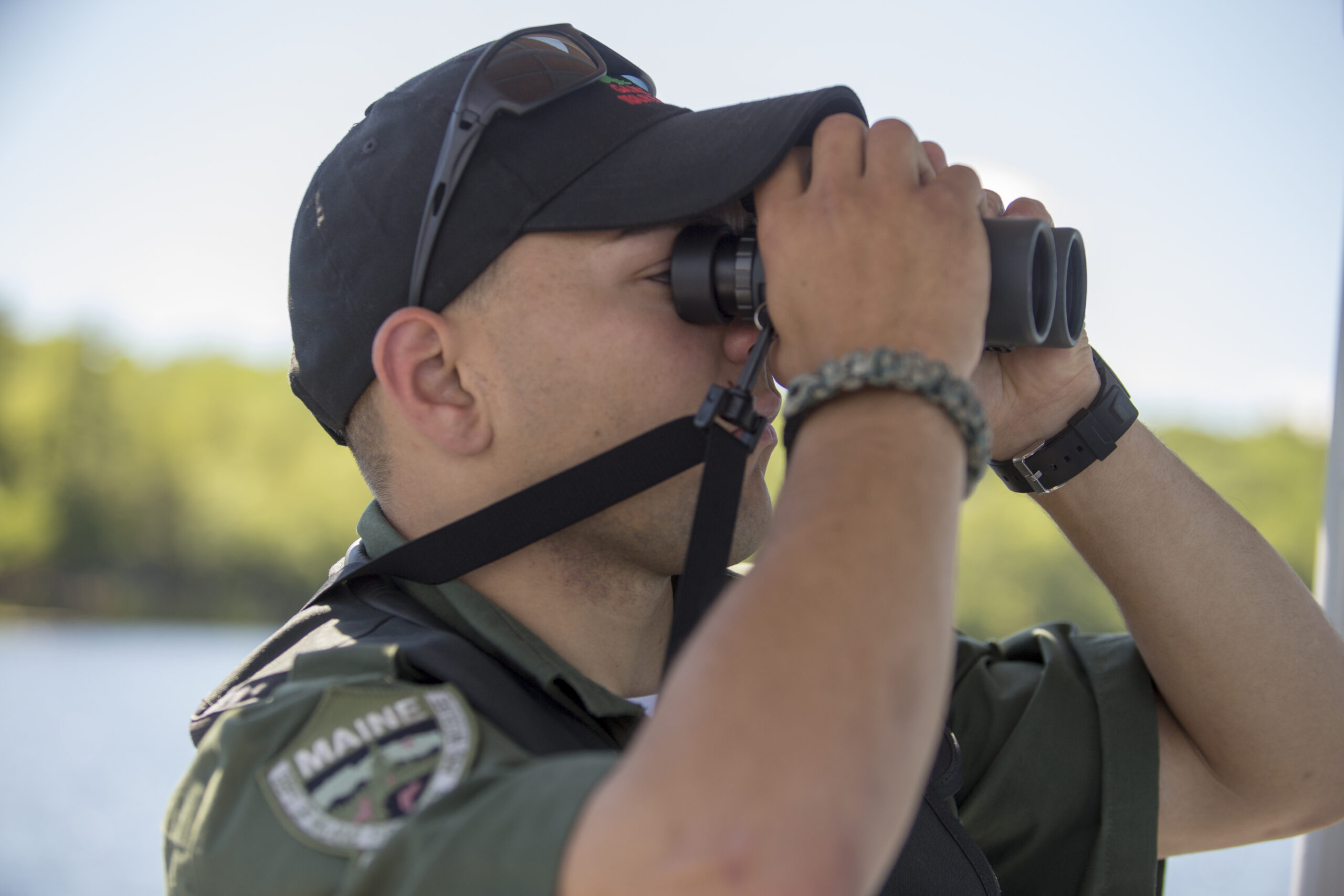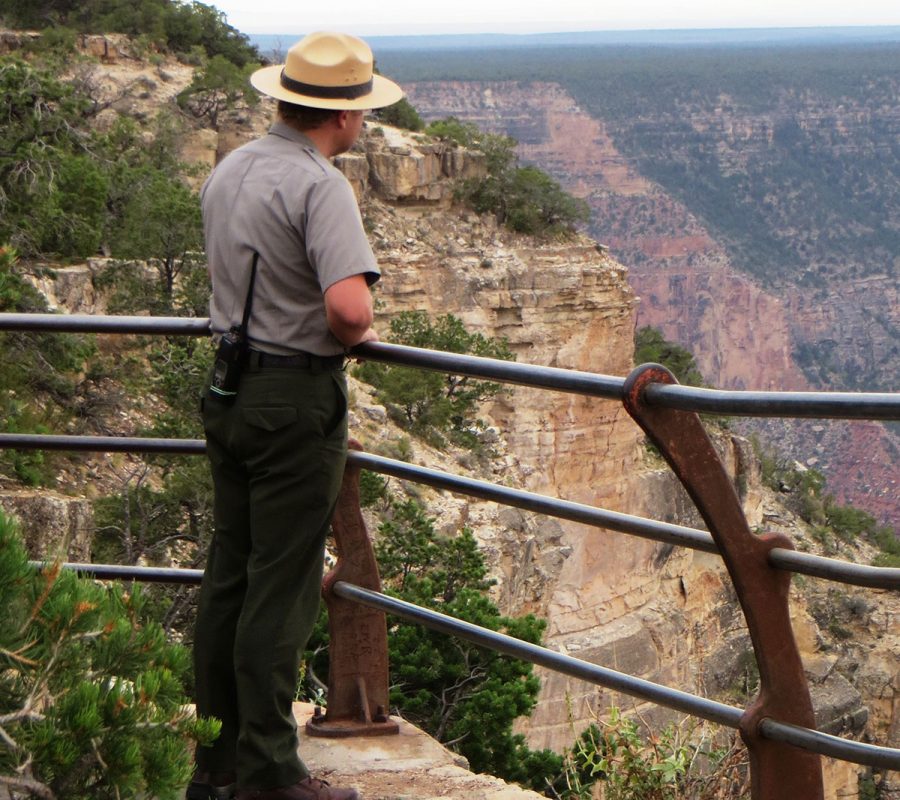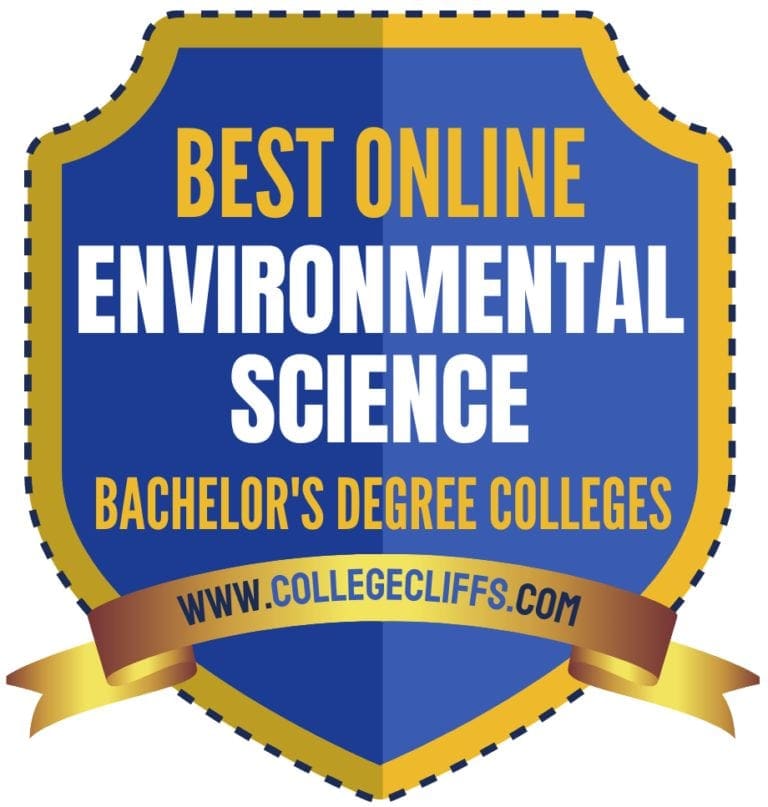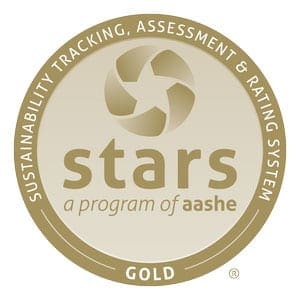Conserve and Protect Natural Resources & The Environment
There is a growing demand for professionals who understand the importance of wildlife conservation and environmental regulation. Whether you’re interested in marine patrol, forest management, conservation enforcement, or wildlife protection, this program provides valuable knowledge and skills for a rewarding career in conservation law enforcement. The in-person bachelor’s degree program in Conservation Law Enforcement offers an immersive educational journey, empowering students with vital skills and knowledge through hands-on experiences in ecology, criminal justice, wildlife and marine law enforcement, courtroom procedure and evidence, firearms training, and an indispensable internship. By fostering a deep understanding of environmental conservation and wildlife protection, this program paves the way for students to embark on fulfilling careers dedicated to safeguarding our natural resources and preserving biodiversity for future generations.
Conservation Law Enforcement Program Highlights
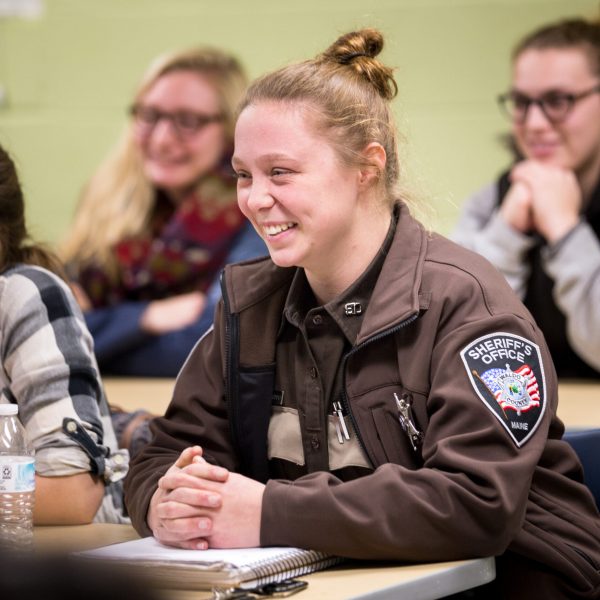
Criminal Justice
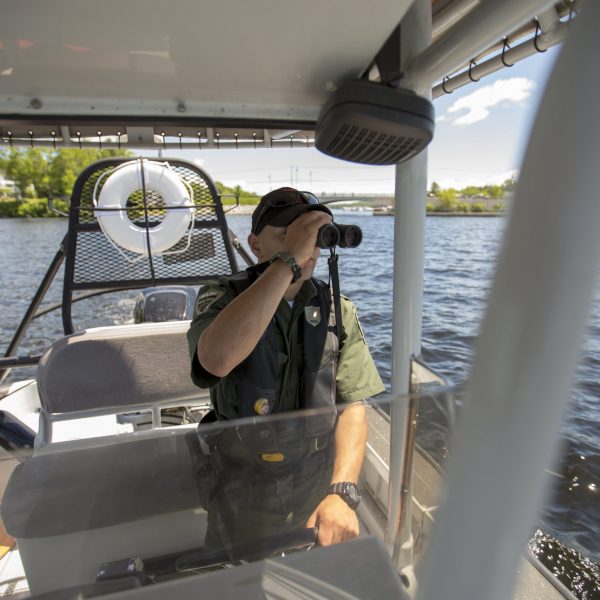
Field Work Skills
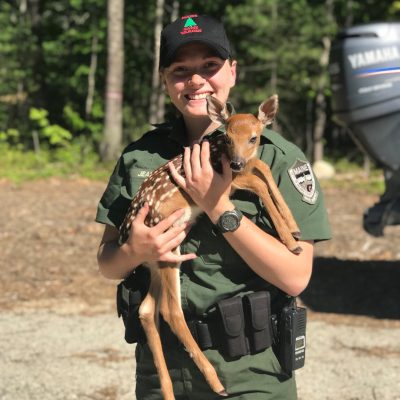
Rewarding Careers
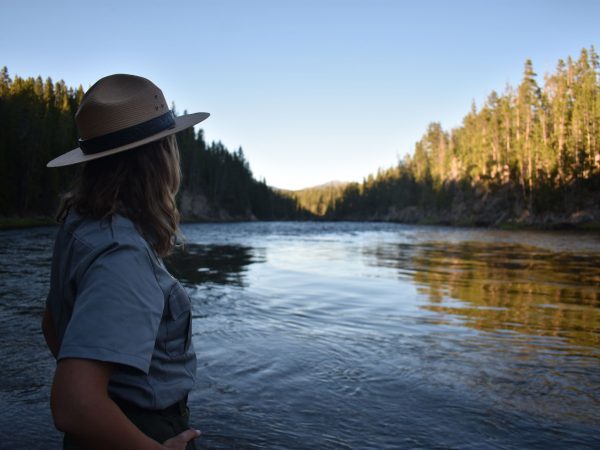
What Students Study
As a conservation law enforcement major, students will study and explore all the skills necessary for becoming successful in conservation and law enforcement careers:
- Crime scene investigation techniques, such as fingerprint lifting, trajectory analysis, footprint and tire tread casting, and evidence collection
- Policy procedures for the preparation and execution of search warrants
- Procedures for conducting interviews and interrogations
- Surveillance techniques
- Proper methods for handling evidence
Participate in career-forward partnerships:
- Earn 15 credits for Basic Law Enforcement Training at the Maine Criminal Justice Academy
- Transfer credits eligible for National Park Service Seasonal Law Enforcement Training Program
- Opportunities to work for the Maine Warden Service
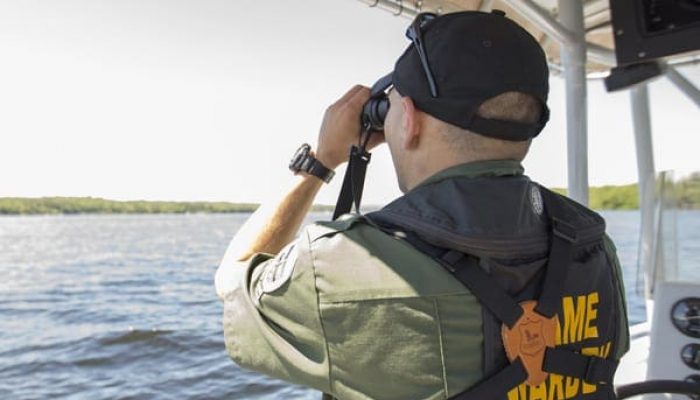
Course List
To earn a Baccalaureate degree in Conservation Law Enforcement, you must complete:
- General Education Core: 44 credits
- Program Core: 39 credits
- Electives: 37 credits
University Wide Requirements: A minimum of 120 earned credit hours, 30 credits at the 300 level or above, a minimum of 30 credits earned at Unity, and an overall cumulative GPA of 2.0 or above.
General Education Core
ART 1001 Creative Expressions: Art and the Natural World | 3 Credits
Unleash your creativity and develop artistic skills as you engage with the intricate beauty of the natural world and explore and reflect on the forms, structures, and patterns of nature. This dynamic course emphasizes personal expression over technical perfection, ensuring a space for artistic exploration. Uncover how the environment can shape your artistic voice through a variety of traditional and digital art media and techniques. Through hands-on projects, demonstrations, and interactive activities, you’ll draw connections between art and science, fostering a deeper understanding of both. Communicate your vision and provide peer feedback in a supportive, in-person learning community, setting the stage for a future where art and ecological consciousness intersect.
Credits: 3
Prerequisites: None
BIO 1001 Nature’s Kaleidoscope: Exploring Life’s Diversity | 3 Credits
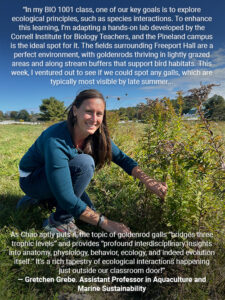 Explore the breathtaking diversity of life on Earth. In this course, you will delve into the realms of macroevolution, organismal structure and function, and the dynamic interactions within ecosystems. Through practical applications and cutting-edge industry practices, students will uncover the mechanisms of evolution and the intricate forms and functions of diverse organisms. This course integrates engaging hands-on activities, immersive fieldwork, and detailed case studies, equipping you with the skills and knowledge necessary to thrive as an environmental science and sustainability professional.
Explore the breathtaking diversity of life on Earth. In this course, you will delve into the realms of macroevolution, organismal structure and function, and the dynamic interactions within ecosystems. Through practical applications and cutting-edge industry practices, students will uncover the mechanisms of evolution and the intricate forms and functions of diverse organisms. This course integrates engaging hands-on activities, immersive fieldwork, and detailed case studies, equipping you with the skills and knowledge necessary to thrive as an environmental science and sustainability professional.
Credits: 3
Prerequisites: None
BIO 1002 Nature’s Kaleidoscope: A Laboratory Exploring Life’s Diversity | 1 Credit
Discover the wonders of biological diversity through Nature’s Kaleidoscope: A Laboratory Exploring Life’s Diversity. This course offers an immersive and interactive lab experience, revealing the intricate patterns and processes that shape life on our planet. Through hands-on experiments and engaging activities, you’ll explore the rich tapestry of life, honing your scientific inquiry skills. This course prepares you for careers in environmental science and sustainability by providing practical knowledge and laboratory expertise.
Credits: 1
Prerequisites: BIO 1001 (or concurrent enrollment)
CAR 1001 Essential Skills for Success and Career Planning | 1 Credit
This 1-credit course equips students with essential skills to excel in their studies and transition smoothly into their chosen careers. Students will engage in strategic goal setting and explore career paths using design thinking principles. Key activities include conducting industry research, participating in relevant career and industry events, and developing a personalized career plan. Additionally, students will gain valuable insights into critical thinking, self-advocacy, and effective use of campus resources.
Credits: 1
Prerequisites: None
CHM 1001 Chemistry in Action: From Theory to Practice | 3 Credits
Explore the fascinating world of chemistry, where you will dive into atomic theory, investigate the fundamental components of matter, master chemical bonding, and uncover molecular structure and reactivity. Additional emphasis is placed on nomenclature, stoichiometry, orbitals, electron configurations, the periodic table, intermolecular forces, aqueous solutions, and basic chemical reactions. Learn to balance chemical equations and explore key reactions such as acid/base, precipitation, and redox. This course equips students with essential knowledge needed to tackle the intricate environmental issues of tomorrow.
Credits: 3
Prerequisites: None
COM 1001 Rhetoric in Nature: Writing for Environmental Impact | 3 Credits
Immerse yourself in the art of effective communication, an essential skill for success in environmental and sustainability careers. This course blends interactive workshops with collaborative sessions that enhance your professional writing skills. Learn to craft compelling narratives, reports, and persuasive texts for diverse audiences, with a focus on organization, evidence-based writing, clarity, and cohesion. Develop strategies for drafting, revising, and refining your writing, and become a more impactful communicator ready for professional challenges.
Credits: 3
Prerequisites: None
COM 2001 EcoMedia: Storytelling for Sustainability | 3 Credits
Dive into the dynamic world of EcoMedia, where the power of storytelling meets environmental advocacy. EcoMedia uses various media platforms and communication strategies to inform, educate, and engage the public on environmental issues. Learn to craft compelling environmental narratives through social media, podcasts, video, and print, promoting sustainability and influencing public policy. Engage in hands-on projects that explore the transformative power of storytelling to shape public perceptions and drive positive environmental actions. Develop skills in media production, strategic communication, and ethical reporting to effectively convey stories. Prepare to become a persuasive advocate for the environment, equipped with the tools to make a meaningful impact through media.
Credits: 3
Prerequisites: None
COM 3001 Messages that Resonate: Creating Impactful Communication | 3 Credits
Elevate your communication skills to make a significant impact. Learn and apply sophisticated techniques for crafting persuasive messages and compelling campaigns. Engage in practical exercises and case studies to analyze and develop effective communication strategies. Gain expertise in leveraging digital tools, engaging with diverse stakeholders, and addressing complex ethical considerations. Develop essential skills to effectively convey your messages to diverse audiences, preparing you for success in today’s dynamic job market
Credits: 3
Prerequisites: None
ENV 1001 The Life Blood of Our World: Rivers, Lakes, and Streams | 3 Credits
Dive into the dynamic world of rivers, lakes, and streams! Discover the science and significance of freshwater ecosystems as you explore their endless diversity. Students from all programs discover how these vital water bodies are more than just scenic landscapes; they are the lifeblood of our ecosystems and societies. See firsthand through immersive field trips and interactive projects how these waterways support diverse wildlife, drive local industries and recreation, and play a crucial role in enriching communities. Inspired by the boundless opportunities for protecting and preserving our precious natural resources, this course prepares you to make a transformative difference in your future career.
Credits: 3
Prerequisites: None
ENV 2001 Environmental Resilience: Tackling Climate Challenges | 3 Credits
Dive into one of the most pressing and intricate challenges of our time – climate change. This course takes students on a journey to explore the profound effects of climate change on ecosystems, wildlife, and human societies, both locally and globally. Immerse yourself in climate data analysis, modeling, hands-on projects, and field experiences that equip you to address these challenges head-on. The course culminates with innovative strategies for climate mitigation and adaptation, empowering you to develop sustainable solutions and prepare for careers as environmental professionals. This course is not just about learning, it’s about making a difference in the world. Are you ready to take on the challenge?
Credits: 3
Prerequisites: None
EVJ 3001 Ethics at Work: Practical Approaches to Decision-Making | 3 Credits
Navigate the complexities of ethical decision-making, a crucial skill for creating a just and equitable world. Learn practical strategies, tools, and techniques to discern ethical implications and make informed decisions. Plunge into ethical philosophy to understand the foundations of ethical awareness and action. Engage with case studies to develop your ability to distinguish difficult decisions from true ethical dilemmas. Practice deliberating on a variety of ethical issues drawn from social and professional contexts, preparing to lead with integrity and make impactful, ethical choices in your career and beyond.
Credits: 3
Prerequisites: None
HIS 2001 The Past is Present: America’s Environmental History | 3 Credits
Immerse yourself in the dynamic narrative of America’s environmental history from pre-Colonial times to the present. Explore how human societies and natural environments have continuously shaped each other through pivotal events like the Dust Bowl and the environmental movement of the 1960s and 1970s. Engage with digital archives and artifacts to uncover ecosystem transformations, industrial impacts, and cultural shifts. Participate in hands-on activities, field trips, and real-world case studies that bring historical analysis to life. This course not only provides critical insights into the past but also equips you with the skills to address contemporary environmental challenges, preparing you for impactful careers.
Credits: 3
Prerequisites: None
INT 4001 Environmental Impact Internships: Career Pathways OR CAP 4001 Pioneering Change: Capstone in Environmental Solutions | 3 Credits
INT 4001 Environmental Impact Internships: Career Pathways
Embark on a transformative journey with the Environmental Impact Internship, where academic knowledge meets real-world practice. Envision yourself collaborating with seasoned professionals, addressing pressing environmental issues, and expanding your professional network. This internship experience provides a distinctive combination of practical experience and thoughtful reflection, equipping you wit the essential skills for a successful career. You’ll take charge of diverse tasks, strengthen your skills, and grow your potential as an environmental professional. This hands-on approach will also enhance your problem-solving and leadership skills in preparation for your future career.
Credits: 3
Prerequisites: 60 credits
May be taken more than once for up to twelve credits. All credits beyond three count as elective credits.
CAP 4001 Pioneering Change: Capstone in Environmental Solutions
Step into the final, thrilling phase of your academic journey with Pioneering Change: Capstone in Environmental Solutions. This course brings together the knowledge and skills you’ve acquired throughout your degree to confront real world environmental challenges. Working in diverse teams, you will develop impactful solutions and present them through a professional-grade project. This immersive experience hones your problem-solving and communication abilities, showcasing your readiness to potential employers to address critical environmental issues. Get ready to make a lasting impact on the world!
Credits: 3
Prerequisites: At least one 4000-level major core course and 60 credits. Or 90 total credits.
LDR 4001 Inspiring Action: Transformational Leadership Strategies | 3 Credits
Become a catalyst for positive change. Reflect on your personal leadership style, learn to build meaningful relationships, and understand the impact of leadership within complex systems. Through case studies in various sectors such as business, government, nonprofit, community, and education, examine organizational behavior and culture, and practice consensus building and project management to drive effective change. Develop practical tools that will empower you to navigate and lead effectively in your future career, ensuring you are equipped to inspire and manage transformational change.
Credits: 3
Prerequisites: 60 credits
MTH 2001 Data is Power: Drawing Insights from Statistics | 3 Credits
Unlock the power of data and develop insights into pressing environmental issues. Apply essential statistical tools to collect, analyze, and interpret data about real-world environmental challenges such as pollution, biodiversity, and climate change. Engage in hands-on exercises, case studies, and real-world applications crucial for environmental research, monitoring, and management. Gain proficiency in statistical software and data visualization to make meaningful impact in your career and contribute to sustainable solutions for our planet’s future.
Credits: 3
Prerequisites: None
PSY 1001 Mind Matters: An Introduction to Psychology | 3 Credits
Dive into the fascinating world of psychology, uncovering its historical roots and modern advancements. Explore the core subfields: biological, developmental, cognitive, social, and mental health. Develop the skills to critically evaluate psychological research and methodologies, empowering yourself as a knowledgeable consumer of psychological insights. Participate in engaging projects that integrate diverse psychological perspectives, deepening your understanding of human behavior. Gain essential transferable skills including critical thinking, problem-solving, effective communication, and a deep understanding of human behavior that are critical for success in any professional environment.
Credits: 3
Prerequisites: None
Program Core
BIO 2002 Exploring Ecosystems: Structure and Function | 3 Credits
Venture into the intricate web of life, uncovering the complex interactions between organisms and their environments. Examine energy flow, nutrient cycles, and the delicate balance of ecosystems. Engage in hands-on fieldwork and in depth case studies to develop practical skills in analyzing population dynamics and ecosystem functions. Prepare to tackle real-world environmental challenges and apply these skills in your future career.
Credits: 3
Prerequisites: BIO 1001, MTH 2001
CLE 1001 Law and Order: Understanding Criminal Justice | 3 Credits
Examine the multifaceted world of criminal justice through the lenses of history, law, political science, criminology, and sociology. Consider profound questions about citizenship, justice in a democracy, and the essential roles within the criminal justice system. Conduct a comprehensive review of contemporary issues in the criminal justice system with an emphasis on practical skills. Engage in hands-on activities, real-world applications, and interdisciplinary approaches to become prepared for a career as a future criminal justice professional, making a meaningful impact in your community.
Credits: 3
Prerequisites: None
CLE 2001 Substance Recognition: Practical Law Enforcement Skills | 3 Credits
Explore current trends in substance use within society and assess these issues in a law enforcement context. Learn to identify a range of commonly encountered substances and their observable effects on the human body. Recognize the signs and symptoms of substance use and differentiate these from common medical conditions. Understand the potential hazards posed by individuals using substances and develop practical strategies to manage such situations safely and effectively. Equip yourself with critical knowledge and hands-on skills to handle substance use scenarios, enhancing your readiness and effectiveness as a conservation law enforcement professional.
Credits: 3
Prerequisites: None
CLE 2002 The Power of Words: Professional Law Enforcement Communication | 3 Credits
Unlock the power of effective communication in law enforcement. Learn to craft compelling reports and narratives that convey objectivity, clarity, precision, and authority, essential for supporting legal proceedings. Delve into professional standards and ethical considerations that enhance community relations and operational success. Engage in dynamic exercises, role-playing scenarios, and projects to sharpen your interviewing techniques, including verbal judo, for handling diverse situations with confidence. Hone your ability to articulate observations and findings, connect with witnesses, colleagues, and the public, and ensure your messages are impactful. Equip yourself with the communication tools essential for a successful career in law enforcement and public safety.
Credits: 3
Prerequisites: None
CLE 2003 Firearms Training: Safety and Skills for Law Enforcement | 3 Credits
Develop critical skills in the handling, use, and maintenance of firearms within a law enforcement context. Learn essential loading techniques, cleaning methods, and inspection procedures for service weapons used by law enforcement agencies. Gain hands-on range experience and qualify with each weapon according to State of Maine standards. Firearm safety, State of Maine laws on liability, personal responsibility, gun control, concealed weapons, and self-defense are emphasized. Prepare thoroughly through a combination of classroom instruction
and practical sessions, equipping you with the expertise needed to handle firearms responsibly and effectively in the field.
Credits: 3
Prerequisites: None
CLE 3001 Safeguarding Nature: Wildlife and Marine Law Enforcement | 3 Credits
Step into the vital role of wildlife and marine law enforcement, where you’ll focus on protecting and conserving our natural resources. Learn to enforce laws and regulations related to wildlife and marine environments, understanding the unique challenges of these ecosystems. Develop skills in identifying illegal activities, collecting evidence, and conducting investigations specific to wildlife and marine law violations. Gain hands-on experience through fieldwork, case studies, and projects, preparing you to address complex conservation law enforcement issues effectively. Equip yourself with the knowledge and practical skills necessary to safeguard our natural resources and uphold the law in diverse natural settings.
Credits: 3
Prerequisites: None
CLE 3002 Building Trust: Engaging Communities with Integrity | 3 Credits
Explore the critical role of law enforcement officers in the justice system as it pertains to diverse communities, focusing on the impact of systemic racism and various forms of bias, including cultural, gender, and poverty related prejudices. Consider how policy, culture, and organizational practices shape public perceptions and affect law enforcement interactions within the community. Learn strategies for effective communication and ethical decision-making that build trust and strengthen community relations. Equip yourself with the knowledge and skills to navigate and address biases, fostering a more just and equitable approach to law enforcement.
Credits: 3
Prerequisites: None
CLE 3003 Courtroom Preparation: Procedures and Evidence | 3 Credits
Navigate the intricacies of courtroom procedures and the rules of evidence as they apply to law enforcement. Learn the procedures necessary for lawful search, arrest, and interrogation, the foundational principles of presenting evidence in court, the legal standards for admissibility, and the roles of various courtroom personnel. Examine the structure and function of the American court system, constitutional protections in criminal proceedings, and the “exclusionary rules” that ensure these protections. Build a working knowledge of the trial process and develop skills in preparing for court appearances, delivering testimony, and handling cross-examinations. Engage in mock trials, case studies, and collaborative exercises to build confidence and competence in a courtroom setting. Equip yourself with the essential knowledge and practical skills to effectively navigate the legal system to help ensure justice is served.
Credits: 3
Prerequisites: None
CLE 4001 Wildlife Forensics: Crime Scene Investigations | 3 Credits
Immerse yourself in the specialized field of wildlife crime investigation, focusing on the techniques required to solve intricate cases. Dive into the theories and fundamentals of the investigative process, including criminal investigations, investigative interviews, and interrogation techniques. Learn to interpret verbal and physical behavior from a legal perspective. Engage in hands-on forensic science methods, crime scene processing, and evidence collection and preservation. Hone your skills in information gathering, detailed report preparation, and courtroom presentation. Equip yourself to conduct thorough investigations that protect wildlife and uphold conservation law enforcement efforts.
Credits: 3
Prerequisites: CLE 3003 and 60 credits. Or 90 total credits.
EVJ 3002 From Acts to Action: Natural Resource Law and Policy | 3 Credits
Discover the essential role of law and policy in managing and protecting our natural and wildlife resources. Delve into the intricacies of environmental legislation, regulatory processes, and policy development at local, national, and international levels. Examine key laws such as the Clean Water Act, the Endangered Species Act, and the National Environmental Policy Act, analyzing their impacts through case studies and real-world applications. Develop essential career skills that prepare you to navigate the legal landscape, advocate for sustainable practices, champion future policies, and positively contribute to sustainable resource management and conservation in your own way.
Credits: 3
Prerequisites: None
EVJ 3003 Shaping Safe Communities: Environmental Influences on Crime | 3 Credits
Discover how our surroundings influence criminal behavior. Investigate the patterns and trends of crime through a multidisciplinary lens, blending geography, sociology, psychology, and land use. Through dynamic case studies, apply spatial and data analysis techniques, critical thinking, and practical skills with the goal of reducing crime and promoting sustainable urban development and safer communities. Prepare to be at the forefront of environmental criminology and make a tangible impact in the field.
Credits: 3
Prerequisites: None
WFB 3002 Navigating Nature: Wildlife and Fisheries Techniques in the Field | 3 Credits
This immersive course equips you with essential skills and techniques used by wildlife and fisheries professionals to gather critical data for monitoring and managing wild populations. Explore the dynamic relationship between wildlife management and environmental sustainability, gaining practical experience with the latest industry-standard tools and methodologies. Techniques will be tailored to fit the group, season, and available opportunities, potentially including land navigation, duck banding, wildlife immobilization, radio telemetry, electrofishing, and field team leadership. This course prepares you for a wide range of careers in wildlife and fisheries conservation management by fostering skills in data collection, analysis, and field operations, ensuring you are well-equipped to tackle real-world challenges.
Credits: 3
Prerequisites: None
WLD 2001 Exploration Quest: North American Wildlife | 3 Credits
Immerse yourself in the rich biodiversity of North American wildlife. Investigate the biology, ecology, and conservation of various species across the continent. Engage in hands-on activities such as identifying wildlife, assessing habitat needs, and examining population dynamics. Explore contemporary conservation strategies through interactive fieldwork and case studies and prepare for a rewarding career dedicated to protecting and managing wildlife resources.
Credits: 3
Prerequisites: None
Sample Course Offerings within the Major:
- Ecology
- Drug Recognition Training
- Building a Better World: Ethical Decision Making
- Environmental Criminology Courtroom Procedure and Evidence
- Wildlife Crime Scene & Investigative Techniques
- Wildlife & Fisheries Techniques
- Managing Interpersonal Conflict in the Outdoors
- Intro to Criminal Justice
- Report Writing and Communication for Law Enforcement
- Wildlife & Marine Law Enforcement
- Wildlife Policy and Law
- North American Wildlife
- Firearms

